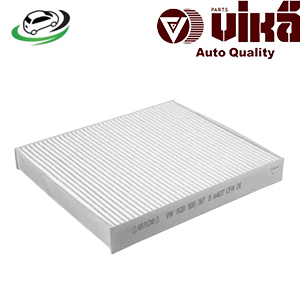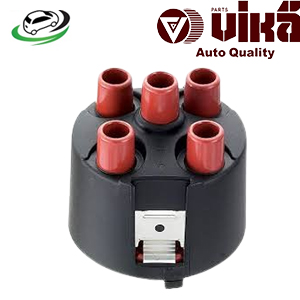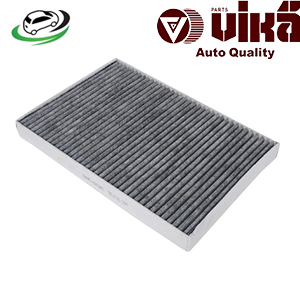-18%
Get AUDI B6 A4/ B6 S4/ B7 A4/ B7 RS4/ B7 S4/ C5 A6/ C5 Allroad/ C5 S6/ RS6 Cabin Filter 8E0819439
A cabin air filter is an often-overlooked but crucial component in modern vehicles, designed to improve the air quality within the cabin. Though relatively small, this filter plays a vital role in ensuring that passengers breathe clean air, free from dust, pollen, and other airborne contaminants. Over time, cabin air filters have evolved from being an optional feature to a standard part of most vehicles, underscoring their importance. In this detailed explanation, we will delve into the functions, benefits, and maintenance tips for cabin air filters.
1. Function of a Cabin Air Filter
The primary function of a cabin air filter is to prevent airborne contaminants from entering the vehicle’s HVAC (heating, ventilation, and air conditioning) system and, subsequently, the cabin itself. These filters are usually located behind the glove box or in the engine bay, and they are designed to filter out various pollutants and particles, ensuring that the air circulating inside the vehicle is clean.
Cabin air filters are typically made of pleated paper, fiber, or an activated charcoal blend. The pleats provide a large surface area for trapping contaminants, while activated charcoal filters are particularly effective at neutralizing odors and filtering out harmful gases such as exhaust fumes.
Key contaminants that a cabin filter traps include:
- Dust and Dirt: Common road debris can enter the vehicle’s ventilation system, creating an uncomfortable environment.
- Pollen: For individuals with allergies, the cabin air filter helps to reduce the amount of pollen entering the vehicle, making the ride more comfortable.
- Smog and Exhaust Fumes: In areas with heavy traffic or industrial pollution, the cabin air filter serves as a barrier, preventing harmful gases from entering the vehicle.
- Mold Spores and Bacteria: These can grow within the HVAC system if the filter is not properly maintained. A clean cabin filter reduces the risk of inhaling such harmful pathogens.
2. Types of Cabin Filters
There are two main types of cabin filters available on the market:
- Particulate Filters: These filters are designed to trap solid particles such as dust, dirt, and pollen. They are basic and effective at capturing larger particles but are less effective at neutralizing odors or filtering harmful gases.
- Activated Carbon Filters: These are more advanced than particulate filters. In addition to capturing solid particles, they also contain activated carbon, which can absorb odors, gases, and other volatile organic compounds (VOCs). This type of filter is ideal for people who drive in urban areas with heavy pollution or for those who are sensitive to smells.
3. Benefits of a Cabin Air Filter
The cabin air filter offers numerous benefits, some of which directly impact passenger health, while others improve the performance of the vehicle’s HVAC system.
- Improved Air Quality: One of the most significant benefits of a cabin air filter is the improvement of the air quality inside the vehicle. It reduces the number of allergens, dust particles, and pollutants, which is especially important for individuals with respiratory issues such as asthma or allergies.
- Enhanced HVAC Efficiency: A clean cabin filter allows the HVAC system to function more efficiently. When the filter is clogged, it restricts airflow, forcing the air conditioning or heating system to work harder to circulate air. This can result in reduced performance and higher energy consumption. A fresh filter ensures that the system operates at optimal efficiency.
- Odor Control: Activated charcoal filters absorb and neutralize unpleasant odors from the outside environment. This is especially useful when driving in areas with high pollution or near industrial zones where smog and other pollutants are prevalent. It also helps to eliminate musty or stale odors that may develop inside the vehicle over time.
- Protects the HVAC System: A clogged or dirty filter can cause damage to the HVAC system over time. When airflow is restricted, it places additional strain on the blower motor, leading to potential wear and tear. Replacing the cabin air filter regularly reduces the risk of costly repairs to the HVAC system.
- Improves Comfort: Clean air and proper ventilation are crucial for comfort, especially during long drives. Passengers are more likely to feel comfortable and less fatigued when the air inside the vehicle is fresh and free from pollutants.
4. Maintenance and Replacement of Cabin Air Filters
Like any other vehicle component, the cabin air filter requires routine maintenance to ensure it continues to function correctly. Over time, the filter becomes clogged with dust, debris, and other particles, reducing its effectiveness. Therefore, regular replacement is necessary to maintain air quality and HVAC performance.
When to Replace the Cabin Air Filter
The general recommendation for replacing a cabin air filter is every 12,000 to 15,000 miles (approximately 20,000 to 25,000 kilometers) or once a year. However, the actual frequency may vary depending on driving conditions and the specific make and model of the vehicle.
- Urban Environments: Drivers who frequently travel in heavily polluted areas, such as cities with high traffic congestion or industrial zones, may need to replace the cabin filter more often. These areas have higher levels of smog, exhaust fumes, and dust, which can clog the filter more quickly.
- Rural or Off-Road Conditions: In rural or off-road driving, the cabin filter may also need to be replaced more frequently due to increased exposure to dust, dirt, and debris from unpaved roads.
- Allergies and Sensitivity: For drivers or passengers who suffer from allergies, replacing the filter more regularly can help to reduce symptoms by keeping the air inside the vehicle as clean as possible.
Signs of a Clogged Cabin Air Filter
There are several signs that indicate a cabin air filter may need replacement:
- Reduced Airflow: If you notice a decrease in airflow from the vents, even when the fan is set to a high speed, it may be a sign that the filter is clogged.
- Unpleasant Odors: A musty or stale smell inside the vehicle could indicate that the cabin filter is filled with trapped contaminants. In some cases, mold or mildew may have formed on the filter.
- Increased Noise from the HVAC System: A clogged filter can cause the blower motor to work harder, which may result in a louder or unusual noise when the HVAC system is operating.
- Foggy Windows: In some cases, a dirty cabin filter can contribute to moisture buildup inside the vehicle, leading to fogged-up windows that are slow to clear.
How to Replace a Cabin Air Filter
Replacing a cabin air filter is generally a straightforward task that can be completed by following these steps:
- Locate the Cabin Filter: In most vehicles, the cabin air filter is located behind the glove box or under the dashboard. Consult the vehicle’s owner manual for the exact location.
- Remove the Filter Housing: Once located, you may need to remove a cover or fasteners to access the filter housing.
- Replace the Filter: Take out the old filter and insert the new one, ensuring that it is oriented correctly. Many filters have arrows indicating the direction of airflow, so make sure the new filter is installed the right way.
- Reassemble and Test: Replace the cover or fasteners and test the HVAC system to ensure proper airflow.
5. Conclusion
In conclusion, the cabin air filter plays an essential role in maintaining air quality inside a vehicle, enhancing comfort, and ensuring the efficient operation of the HVAC system. Regular maintenance and replacement are critical to ensuring that the filter continues to perform optimally, providing passengers with clean, fresh air. Whether you live in a busy urban environment or frequently drive on rural roads, replacing your cabin air filter at the recommended intervals will improve your driving experience and protect your health.
Follow us on Facebook for more parts.




Reviews
Clear filtersThere are no reviews yet.